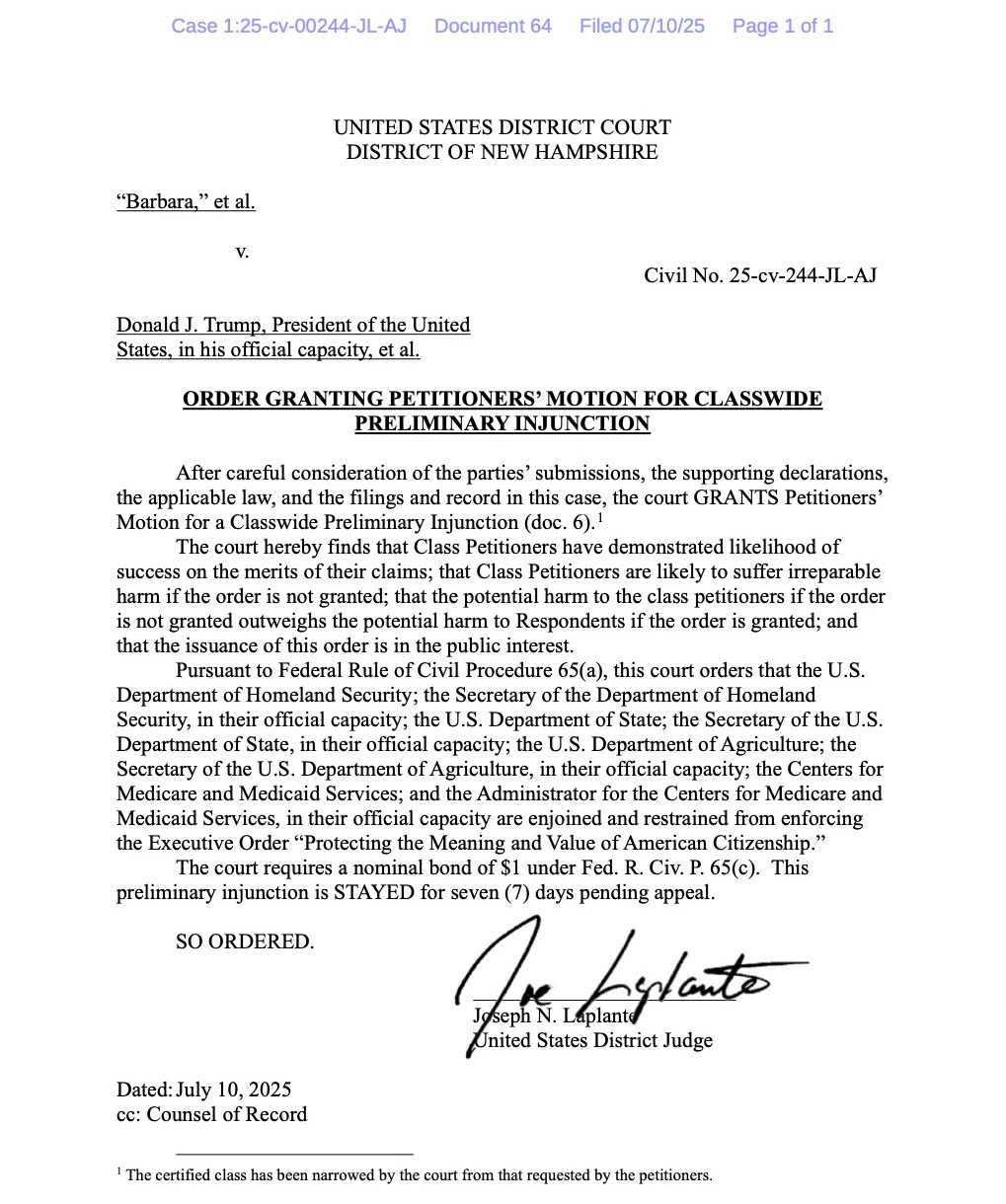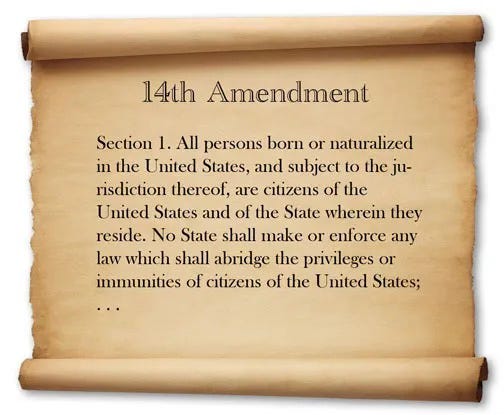Update: Birthright Citizenship
Explainer: A New Hampshire Court Has Stayed Enforcement Of Trump’s Order
UPDATE: July 10, 2025
A federal judge in Concord, New Hampshire has stayed enforcement of Trump’s Executive Order nullifying the birthright citizenship clause of the Fourteenth Amendment.
As discussed in my July 2, 2025 update (below), although the Executive Order deals with birthright citizenship and the Supreme Court decision deals with the Executive Order, the Supreme Court’s recent decision did not rule on birthright citizenship.
Rather, it ruled on the propriety of federal district courts (trial courts) issuing “universal injunctions,” or orders that apply to everyone in the United States rather than just the people involved in a particular lawsuit.
I suggested that other legal mechanisms would likely prevent enforcement, and this order is one such mechanism. The ruling above says that children born in the United States would be denaturalized by the Executive Order are a class of people who have standing to sue in a “class action.”
The Court’s injunction prevents any action withdrawing the citizenship of this class of people until the case is decided. This has exactly the same effect as a universal injunction.
Again, the United States Supreme Court will likely rule on the merits of Trump’s birthright citizenship Executive Order soon. Unless overturned by the First Circuit Court or Supreme Court, birthright citizenship remains until the Supreme Court rules.
Watch this space.
UPDATE: July 2, 2025
On June 27, the United State Supreme Court ruled in Trump v. CASA, Inc. The ruling deals with President Trump’s January 20, 2025 Executive Order annulling the Fourteenth Amendment’s birthright citizenship guarantee (original post, below).
Although the Executive Order deals with birthright citizenship and the Supreme Court decision deals with the Executive Order, the Supreme Court did not rule on birthright citizenship.
Rather, it ruled on the propriety of federal district courts (trial courts) issuing “universal injunctions,” or orders that apply to everyone in the United States rather than just the people involved in a particular lawsuit.
President Trump hailed this legal victory and, in the video below, said he intended to:
[P]roceed with numerous policies that have been wrongly enjoined on a nationwide basis and some of the cases we would be talking about about would be ending birthright citizenship which now comes to the fore . . . it was meant for the babies of slaves, it wasn’t meant for people trying to scam the system and come into the country on a vacation.
Universal Injunctions
After President Trump issued his January 20, 2025 Executive Order annulling birthright citizenship, three federal district courts in California, Maryland, and Washington issued injunctions preventing the annulment until the issue could be decided, ultimately by the United States Supreme Court.
Each of those courts enjoined enforcement not merely in the judicial districts where they sit, but rather across the nation. This is a “universal,” or “nationwide” injunction and it is this type of injunction that the Supreme Court ruled was unconstitutional.
The injunction preventing the Executive Order from annulling birthright citizenship remains in effect in the judicial districts of those three states. Further, the final sentence and in Trump v. CASA, Inc., reads: “[c]onsistent with the Solicitor General’s representation, §2 of the Executive Order shall not take effect until 30 days after the date of this opinion.”
This means that no citizenship annulment can take place until July 27, 2025 by which time other procedural mechanisms will likely be put in place to prevent immediate enforcement.
The Supreme Court will eventually rule on whether or not birthright citizenship can be annulled by executive order. I am betting that it will decide that in the negative.
Originalism
The Supreme Court’s decision that universal injunctions are unconstitutional is grounded in originalism, a principle of constitutional interpretation that says that when we seek to determine what the constitution means in 2025 we should be guided by what the words meant when originally enacted.
President Trump’s assertion that birthright citizenship was “meant for the babies of slaves” is also an originalist interpretation.
He means that because the 14th Amendment was passed immediately following the Civil War which gave citizenship to former slaves, birthright citizenship was only meant to guarantee citizenship to their children. Because “citizenship” meant “babies of slaves” on July 9, 1868 (ratification of the Fourteenth Amendment) it must mean “babies of slaves” in 2025.
I have much to say about originalism, which I will defer to another time. For now, I will point out it is selectively applied. For example, if the meaning of “birthright citizenship” is frozen in time at 1868 it is difficult to explain District of Columbia v. Heller (2008).
In that case originalism’s greatest champion, Justice Antonin Scalia, rejected the argument that the Second Amendment protects only a right to possess and carry a firearm in connection with militia service. Heller ruled that the Second Amendment protects an individual right to possess a firearm.
Why, then, is that right not limited to what “firearm” meant in 1789? If originalism means that the words in 2025 can mean only what they meant when originally drafted, then people should only be permitted to possess front-loaded muskets.
Watch this space.
UPDATE April 17, 2025
As discussed below in American Karma’s January 22, 2025 post, on his first day President Trump signed an Executive Order ostensibly revoking the Fourteenth Amendment’s birthright citizenship provision.
No fewer than three federal district courts issued stays of that Executive Order and today the United States Supreme Court ordered oral argument.
The court agreed to hear arguments on those applications, which focus on whether lower court judges went too far in imposing a nationwide pause on the policy.
To be clear, the Court will be considering the propriety and scope of the court-ordered stays of enforcement, not whether a president can revoke birthright citizenship with an Executive Order.
ORIGINAL POST JANUARY 22, 2025
Birthright citizenship is as clear and unambiguous as any Constitutional principle can be.
The 14th Amendment (1868) reads: “all persons born in the US are citizens of the US and the state where they reside;” in 1898 the United States Supreme Court upheld the 14th Amendment’s birthright citizenship provision in its landmark decision United States v. Wong Kim Ark. The Court said:
The foregoing considerations and authorities irresistibly lead us to these conclusions: the Fourteenth Amendment affirms the ancient and fundamental rule of citizenship by birth within the territory, in the allegiance and under the protection of the country, including all children here born of resident aliens . . .
The Amendment, in clear words and in manifest intent, includes the children born, within the territory of the United States, of all other persons, of whatever race or color, domiciled within the United States.
Put simply, if you were born in the United States, citizenship is your birthright.
Wong Kim Ark’s plain reading of the 14th Amendment has been the law of the land for 127 years. It is, as lawyers say, “still good law.”
Despite all of this, Trump’s Executive Order reads, in relevant part:
[T]he Fourteenth Amendment has never been interpreted to extend citizenship universally to everyone born within the United States.
To be clear, the Fourteenth Amendment has always been interpreted to extend citizenship universally to everyone born within the United States.






